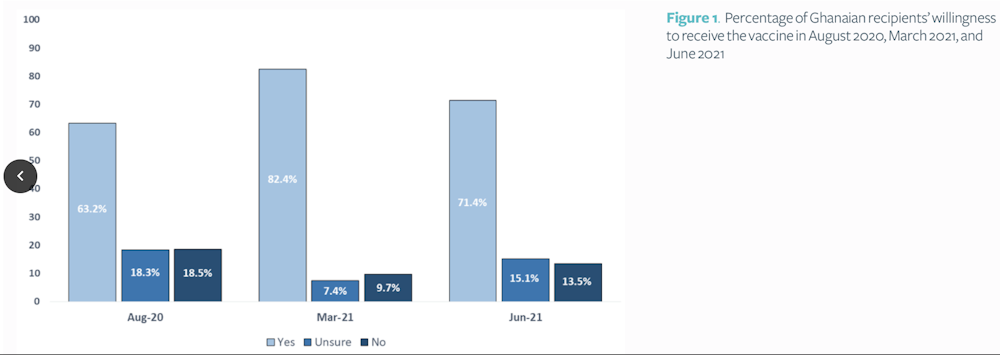coronavirus &COVID-19 &Vaccine Bill Brieger | 25 Aug 2022 08:55 am
COVID-19 Vaccine Hesitancy Is Rising In Ghana: Time To Take Action
Andaratu Wuni has contributed this posting to the Blog site for the JHU site for the course Social and Behavioral Foundations of Primary Health Care.
 (Graphic source: https://www.aafp.org/news/health-of-the-public/20210429vacchesitancy.html)
(Graphic source: https://www.aafp.org/news/health-of-the-public/20210429vacchesitancy.html)
Covid 19 has unarguably wrecked devastating consequences globally since its emergence and has proven to to be a ubiquitous public health health problem. Vaccination against the virus has been shown to be the most effective way of limiting severe disease and mortality. However the spate of vaccine hesitancy in Ghana has continued to rise in the last year. The World Health Organization defines vaccine hesitancy as the delay in acceptance or refusal of vaccination despite availability of vaccination services. This public health problem has far reaching consequences not only in Ghana but globally. Currently the vaccine hesitancy rate in Ghana is about 30% and counting! with people 25 years and under leading the hesitancy core.

(Graph Source: https://figshare.com/articles/thesis/Examining_drivers_of_COVID-19_vaccine_hesitancy_in_Ghana/14494851)
Since Ghana rolled out vaccines to the general public over one year ago, only 25.9% of the population have been fully vaccinated as of August 19,2022.Ghana has a target of vaccinating 22.9million eligible Ghanaians; that is about 60% of the population in order to achieve herd immunity, however only 8.2 million Ghanaians have been fully vaccinated to date.
Many reasons account for the rise in covid 19 vaccine hesitancy in Ghana; from the depletion of rigorous and continuous education and the consequent lack of community engagement, relaxation of covid 19 protocols, to vaccine misinformation and conspiracy theories as well as political influence. It is time for a policy that will mitigate this crucial problem, which the WHO(before the covid pandemic) described as one of the top ten greatest threats to global health.
The truth is, a single policy may not totally solve the problem as the issue of vaccine hesitancy is a complex one. The best approach will be for policymakers to enact policies to make vaccination a condition for other essential services in Ghana.
Intensify mandatory vaccination especially in high risk individuals and high risk locations, eliminate vaccine exemptions based on all but health related reasons, commit to structured community engagements and outreaches using the key stakeholders like the Ghana Medical Association and the Public Health association of Ghana, use stakeholders like UNICEF Ghana and the Ghana Health Service to disseminate accurate and scientifically proven vaccine information and last but not least introduce incentives for citizens who take the vaccine.